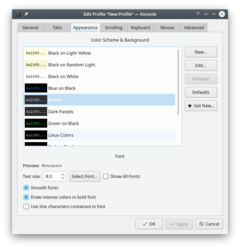Konsole: Difference between revisions
Appearance
m Added breadcrumbs |
m Added Language Bar Template |
||
| Line 1: | Line 1: | ||
{{Template:I18n/Language Navigation Bar|Konsole}} | |||
[[Welcome_to_KDE_UserBase|Home]] >> [[Applications]] >> [[Applications/Desktop|Desktop]] >> [[Konsole]] | [[Welcome_to_KDE_UserBase|Home]] >> [[Applications]] >> [[Applications/Desktop|Desktop]] >> [[Konsole]] | ||
== KDE 3 / KDE 4 Tips == | == KDE 3 / KDE 4 Tips == | ||
Revision as of 17:18, 21 November 2008
Template:I18n/Language Navigation Bar Home >> Applications >> Desktop >> Konsole
KDE 3 / KDE 4 Tips
Language
With Konsole You can change the language to plain English (to see bugs info for example) by command:
export LANG=C
Shortcuts
- Switch tab: SHIFT+LEFT, SHIFT+RIGHT (not like X-Chat, Firefox, Quanta, Kdevelop). Note that Quanta and Kdevelop use ALT+LEFT, ALT+RIGHT. However, SHIFT+DIRECTION has the advantage of being reachable with one hand on virtually all keyboard layouts, while ALT keys are sometimes only on the left of the keyboard (e.g. in Germany).
- New tab: SHIFT+CRTL+N.
External links
KDE 3 Tips
Layout
With Konsole from CVS, you can remove every toolbar, frame and border with this command:
konsole --nomenubar --notoolbar --noscrollbar --noframe
Shortcuts
- Menu : CTRL+ALT+m (not F11 or CTRL+F)
- Mouse emulation (with the keyboard): ALT+F12
Session Profiles
- If the screen is difficult to read, change the default profile:
- Use Settings > Schema to change this to a display with greater contrast. White on Black is clearer than Linux Colors, or you may prefer Green on Black.
- Transparent windows can be set, but they use more resources.
- To add a new profile by simply starting a new session tab and editing it.
- All the changes can be made from the Settings menu
- Use a different font or encoding.
- Set a new Schema to give visual differentiation
- When the display is as you want it, Save Session Profile, giving it a distinctive name.
KDE 4 Tips
- To add a new profile go to Settings > Profile Management > New Profile
- On the General tab, enter the new profile name and change the icon if desired.
- If this is to be a root konsole, enter the command
/bin/su -
This command will not work on any distro that uses sudo (like Ubuntu). On such distributions use:
sudo su
or just prepend all your commands that requires superuser priviledges with sudo.
- Font size can also be changed on the Appearance tab.

- On the Manage Profiles screen you can add or remove a star, which controls whether that profile is to be offered on the File menu.
